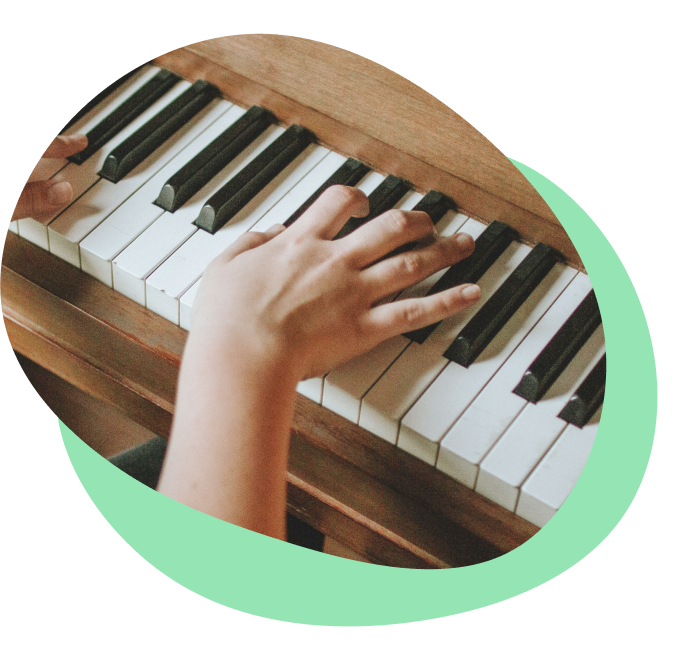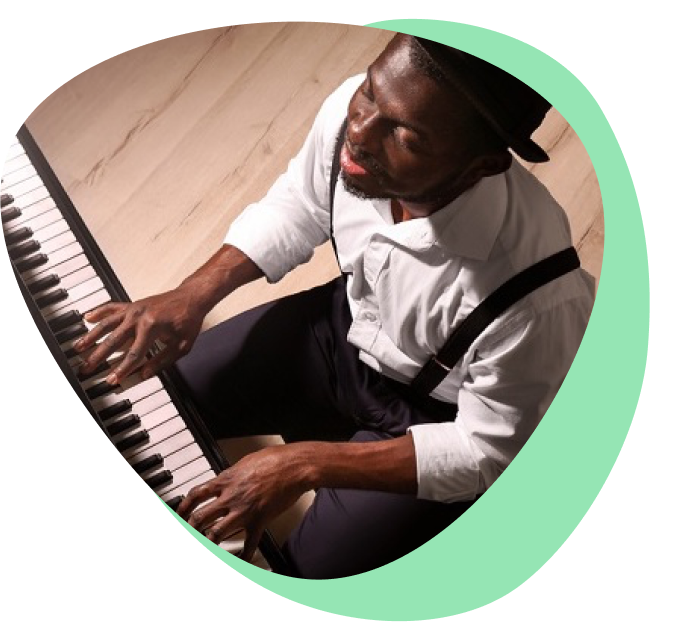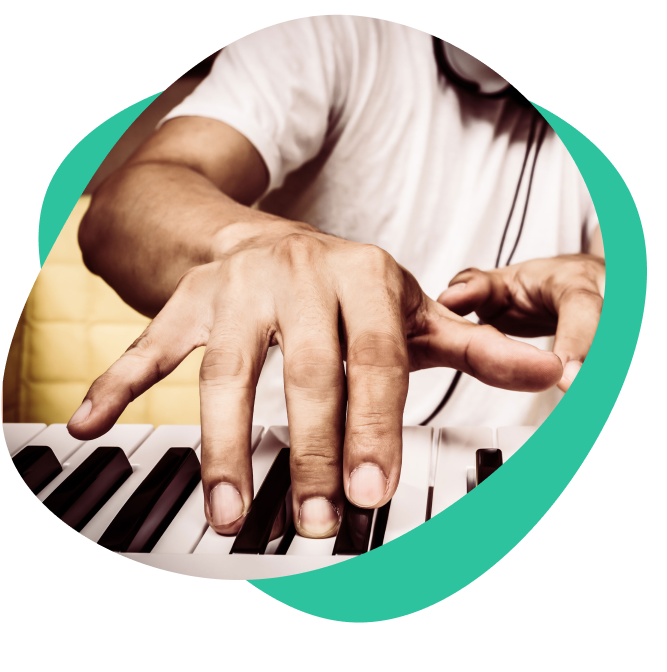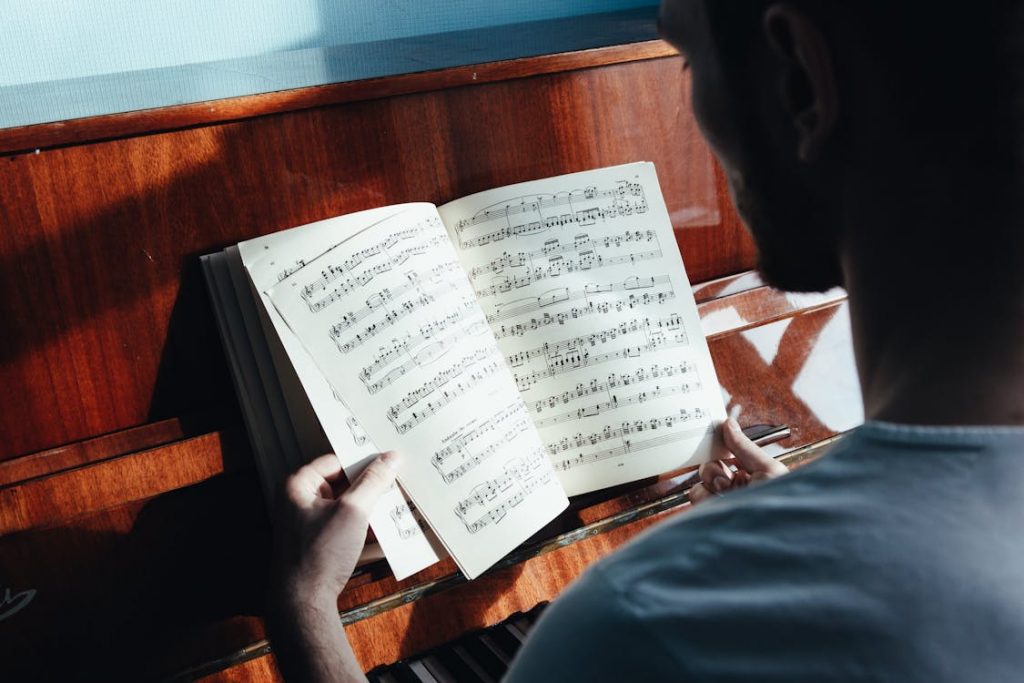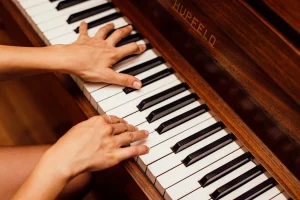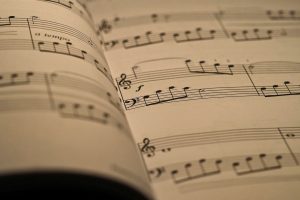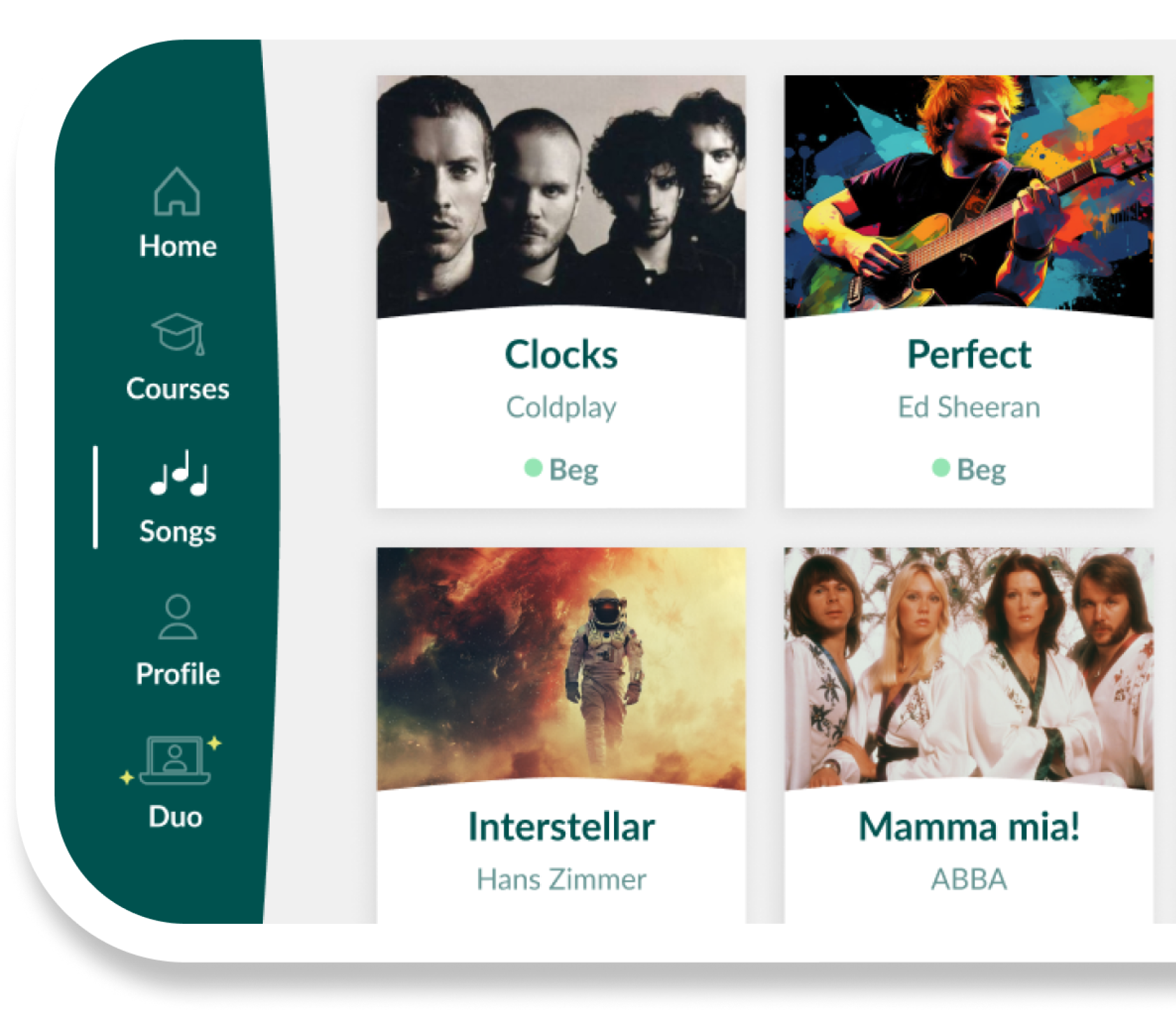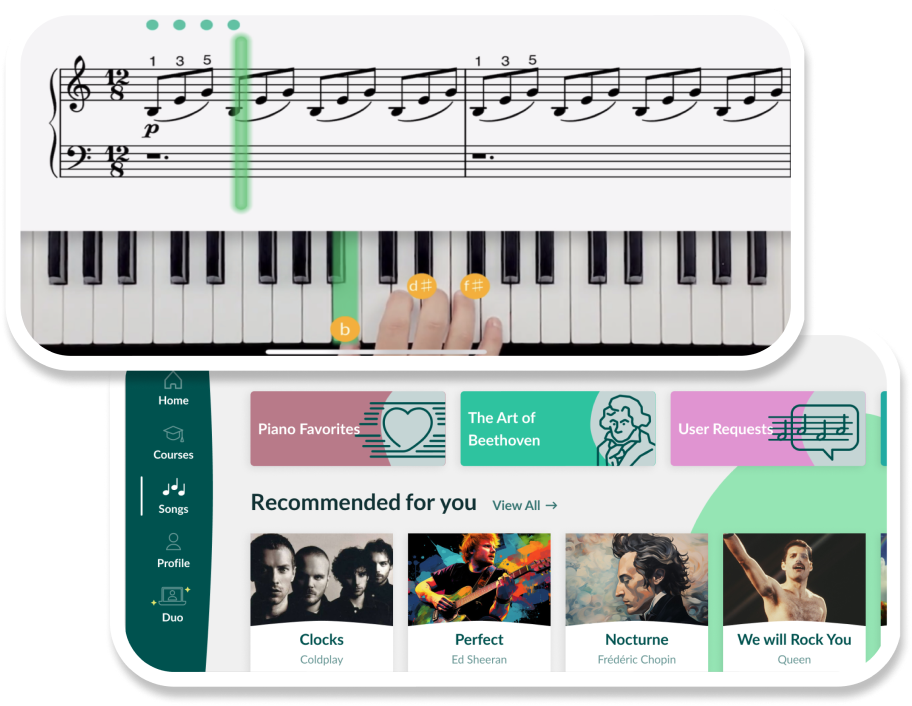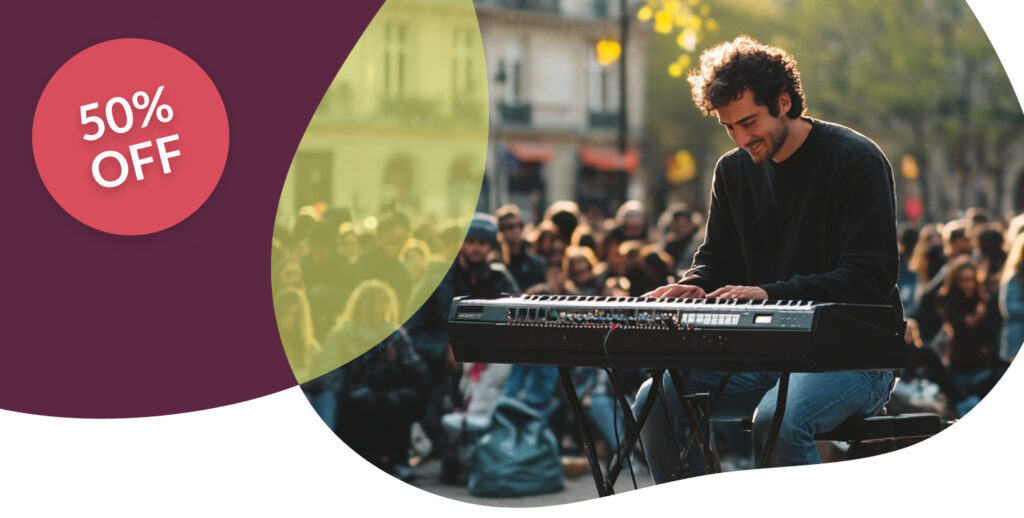It is never too late to learn a musical instrument. While many virtuosos begin studying instruments when they are children, that doesn’t mean that later beginners cannot reach a high level of skill or creative satisfaction.
The piano is an excellent choice for adult beginners. It is simple to begin, offers a number of different entry points for space and money, and is fun and full of rich history.
So, the question is can a 40-year-old start learning piano? Absolutely.
And the answer is a resounding yes. Let’s explore why age should never be a barrier to pursuing a passion for music.
- Fall in love with the music - Learn your favorite songs, at a level suitable for you.
- Enjoy interactive piano lessons - Explore courses covering music theory, technique chords & more.
- Get real-time feedback - Skoove's feedback tells you what went well and what needs practice.
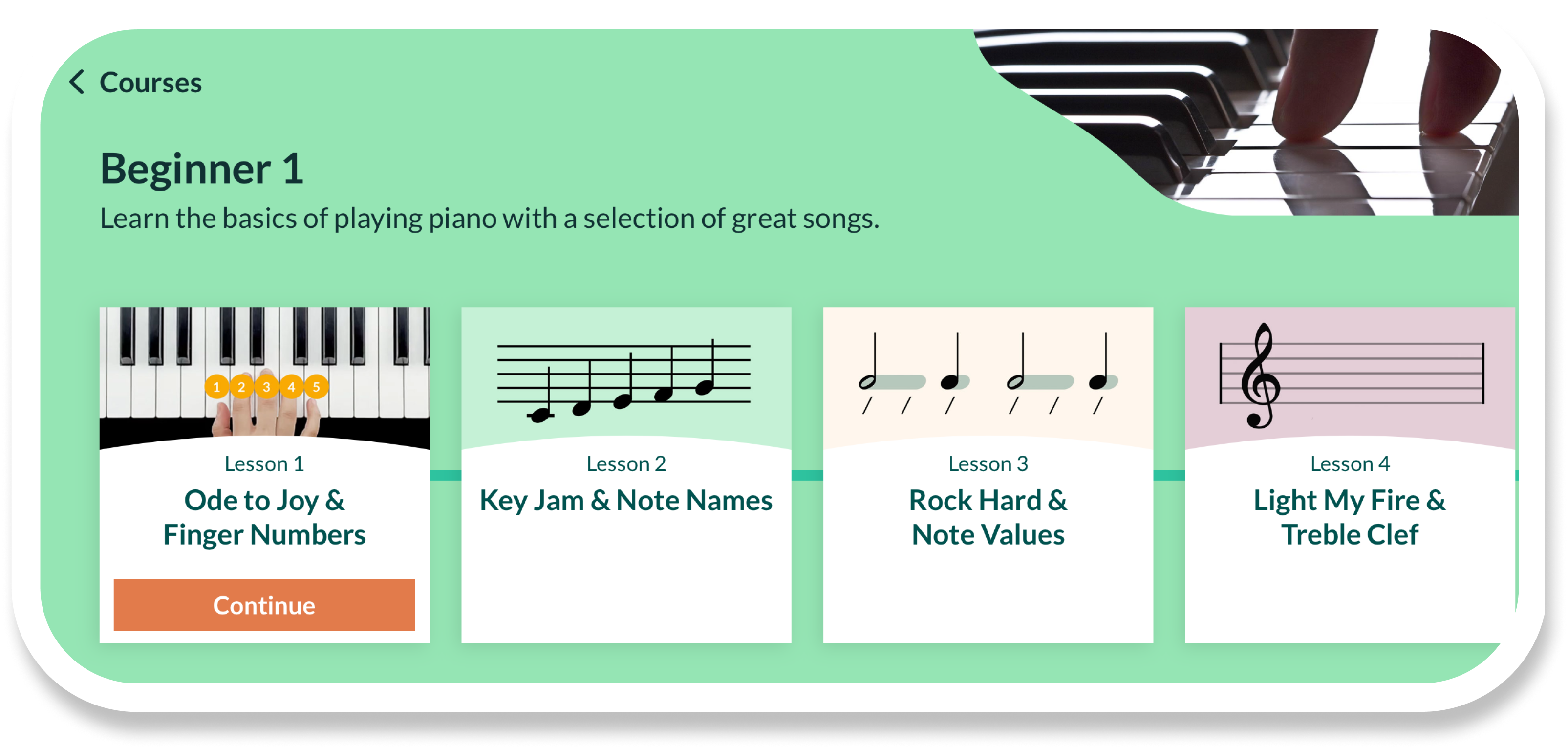
Breaking the myth of age limitations
It’s never too late to learn something new, especially when it comes to music. While it’s true that children may have certain advantages in terms of neural plasticity and time availability, adults bring their own unique set of strengths to the table.
Adults often possess patience, discipline, and a deeper understanding of the value of perseverance – qualities that are invaluable in mastering a musical instrument like the piano.
- Age is not a barrier: While starting young may offer advantages, there’s no strict age limit for learning the piano. People of all ages can embark on this musical journey.
- Realistic expectations: Understand that progress might take longer as an adult, but it’s still possible. Dedication, consistent practice, and setting achievable goals are crucial.
- Personal enjoyment: Learning the piano for personal pleasure is rewarding. Don’t worry about becoming a concert pianist; focus on enjoying the process.
Benefits of learning piano as an adult
Learning piano at 40 can have numerous benefits, such as:
| Cognitive Benefits | Many studies have shown the cognitive benefits of learning a musical instrument. Learning an instrument can help you maintain your mental acuity and help slow down cognitive decline due to age. |
| Stress Relief | Playing piano can help you relieve stress from your day to day life. Having a creative outlet is one of the best ways to relax. |
| Personal Fulfillment | Playing the piano is also a fun and rewarding endeavor. Learning to master a new skill is always a great opportunity to grow and develop and the piano is no exception. |
| Social Connection | Joining a community of fellow musicians, whether through group classes, online forums, or local music groups, can foster social connections and provide a sense of belonging. The shared passion for music transcends age barriers and brings people together in meaningful ways. |
Challenges and considerations
With all that said, starting to learn the piano at 40 can present unique challenges and considerations compared to beginning at a younger age. While the decision to pursue music later in life is undoubtedly rewarding, it’s essential to be aware of potential obstacles and factors that may influence the learning process.
Here are some key challenges to keep in mind:
Time management
Unlike younger students who may not have such extensive work and family responsibilities, older students often have to balance their own creative pursuits around the needs of their families. This is another reason why learning and playing music as a family is a great plan! However, finding dedicated and consistent practice time can be a challenge.
Physical limitations
While adults may face some physical limitations that younger students will not, such as stiffness or pain in the fingers and wrists or pain in the lower back, adults have some other advantages such as more highly developed fine motor functions.
Developing proper technique and posture is crucial to prevent injury and ensure efficient playing, but it may require more effort and patience for adults who are not accustomed to physical activities even when playing a musical instrument online.
Learning curve
While adults bring maturity, discipline, and life experience to the learning process, they may also encounter a steeper learning curve compared to younger students.
Be patient with yourself. Learning a new skill always takes time. Don’t expect amazing results overnight, unless you put in an equally amazing amount of time!
Cognitive adaptation
Learning to play the piano requires cognitive skills such as memory, attention, and problem-solving, which may need to be adapted or strengthened in adulthood. It may take more effort for your brain to learn and absorb information.
So, be patient, go slow, and enjoy the process of learning music.
Self-perception and confidence
Adults may grapple with self-perception and confidence issues when starting a new hobby or skill later in life. Overcoming feelings of self-doubt, fear of failure, or comparison to younger, more experienced musicians is essential for maintaining motivation and progress.
Overcoming any sort of fear of failure or self-doubt is not easy. Nor is constantly comparing yourself to younger students a recipe for success. So, focus on your comparing your skills today to your skills yesterday and you will do fine.
Financial considerations
Learning the piano as an adult may entail financial considerations, including the cost of lessons, instrument maintenance, and purchasing learning materials or equipment. Budgeting for these expenses and ensuring access to necessary resources is important for sustaining a long-term commitment to learning and practicing the piano.
Social support and peer interaction
Unlike children who may have access to structured music education programs in school or extracurricular activities, adult piano learners may need to actively seek out social support and peer interaction. Joining a community of fellow musicians, participating in group classes or workshops, or connecting with online forums can provide valuable encouragement, accountability, and camaraderie on the musical journey.
No matter the challenges, learning to play the piano at 40 can be a fantastic and fulfilling experience. With some dedication, consistency, and a positive mindset, you can overcome any piano obstacles, develop great piano skills, and achieve a high level of creative satisfaction with music at any age.
Nevertheless, all is never lost. You can still learn piano at 40, especially when following these considerations:
Patience and perseverance
Learning piano takes time, and progress may be slow at times. It’s essential to be patient with oneself and to embrace the journey, knowing that every small improvement is a step forward.
Finding the right resources
Whether it’s enrolling in lessons with a qualified instructor, utilizing online tutorials, or lessons like those from Skoove, finding the right resources is essential for effective learning. Tailoring the approach to individual learning styles and preferences can make the process more enjoyable and productive.
The video below showcases the experience that a YouTuber undergoes after a month of learning how to play the piano at 40 years old. The YouTuber highlights how playing easy songs with simple notes that didn’t require hand movements became easier.
Moreover, the video highlights her key challenges as a 40-year-old beginner pianist, such as uncontrolled pauses between bars. However, the video highlights various methods to mitigate this, especially reiterating practice.
Age is just a number
Not only is it possible for a 40-year-old to start learning piano, but it can also be a deeply rewarding experience. With the right mindset and approach, anyone can embark on a musical journey that enriches their life, regardless of their age. Studies have shown that learning an instrument later in life can improve mental health, enhance cognitive abilities, and even increase life satisfaction.
So, if you’re considering taking up the piano, don’t let the number of years you’ve lived hold you back. Instead, let it propel you into a new and exciting chapter of musical discovery. Embrace the challenge with enthusiasm, and you may find that playing the piano offers not only musical fulfillment but also a wonderful way to connect with others and express yourself creatively.
Author of this blog post:
Susana Pérez Posada

With over seven years in piano education and a deep passion for music therapy, Susana brings a unique blend of expertise to Skoove. A graduate in Music Therapy from SRH Hochschule Heidelberg and an experienced classical pianist from Universidad EAFIT, she infuses her teaching with a holistic approach that transcends traditional piano lessons. In her writings for Skoove, Susana combines her rich musical knowledge with engaging storytelling, enriching the learning experience for pianists of all levels. Away from the piano, she loves exploring new places and immersing herself in a good book, believing these diverse experiences enhance her creative teaching style.
Published by Lidya Hovan from the Skoove team




